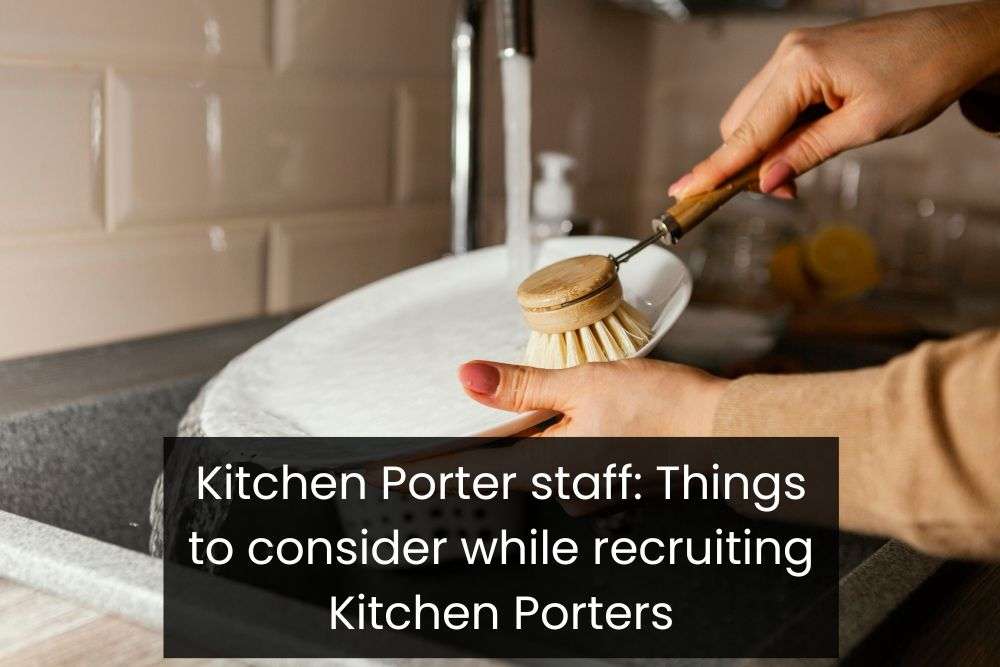A Kitchen Porter’s day begins when the first pot clatters into the sink and doesn’t end until the last plate is spotless. A Kitchen Porter Staff is one of the invisible force behind the scenes, making sure that chefs have the tools they need, that service can continue uninterrupted, and that hygiene standards are met. Without these diligent individuals, a restaurant’s reputation and even its operation could quickly spiral into chaos.
| Key Takeaways |
|---|
| 1. Recruit for qualities like diligence, teamwork, and adaptability. |
| 2. Comply with labor laws, maintain documentation, and promote fairness in recruitment. |
| 3. Develop structured training, provide mentorship, and set clear expectations for Kitchen Porters. |
| 4. Boost retention through engagement, recognition, and addressing workplace challenges. |
| 5. Finding the right Kitchen Porters is essential for a smooth and successful kitchen operation. |
1 Importance of Recruiting the Right Kitchen Porter Staff
Recruiting a Kitchen Porter staff is often an underestimated task in the culinary world, yet it’s one of the most vital. Their role may appear straightforward, but finding the right people for the job can significantly impact the success of your kitchen. Inadequate hiring can lead to an unclean kitchen, unhappy staff, and a drop in overall kitchen efficiency.
The right Kitchen Porters can be the backbone of a smoothly functioning kitchen, contributing to a seamless dining experience for customers. They not only maintain cleanliness but also ensure that chefs have the equipment they need, helping in the preparation process. In short, they are integral to the overall kitchen ecosystem.
Looking for Kitchen Porters?
Call us at 087 738 8306 or Fill the form below and we will get back to you ASAP.
2 Key Qualities and Skills
A. List of Essential Qualities for a Kitchen Porter
Recruiting the right Kitchen Porters begins with a clear understanding of the qualities that define an exceptional candidate. These qualities include:
| Qualities | Description |
|---|---|
| 1. Diligence | Kitchen Porters need to be hardworking and attentive to ensure the kitchen’s cleanliness. |
| 2. Team Player | Collaboration with chefs and other staff is crucial, so being a team player is essential. |
| 3. Stamina | The job is physically demanding, so candidates must have the stamina to keep up the pace. |
| 4. Adaptability | Kitchens can be unpredictable; adaptability helps Porters handle changing situations. |
| 5. Attention to Detail | Spotting and cleaning even the smallest messes is vital for hygiene and safety. |
B. Necessary Skills to Excel in the Role
Beyond qualities, Kitchen Porters should possess specific skills to excel in their role. These skills include:
| Skills | Description |
|---|---|
| 1. Dishwashing | Efficiently cleaning dishes and utensils to maintain a steady supply. |
| 2. Cleaning | Keeping the kitchen spotless, including floors, countertops, and equipment. |
| 3. Time Management | Juggling multiple tasks and ensuring the kitchen remains organized. |
| 4. Communication | Clear communication with chefs and other staff for a smooth operation. |
| 5. Problem Solving | Addressing unexpected issues and finding solutions on the go. |
C. Real-Life Scenarios of Ideal Kitchen Porter Attributes
To put these qualities and skills into context, let’s explore some real-life examples of ideal Kitchen Porter attributes:
- Diligence in Action: Imagine a busy Saturday night in a bustling restaurant. Plates are piling up faster than ever. An exemplary Kitchen Porter, John, works tirelessly, ensuring every dish that comes his way is washed, dried, and neatly stacked. His diligence prevents any slowdown in the kitchen’s rhythm, keeping customers satisfied.
- Team Player: Sarah, a Kitchen Porter, is always ready to help out. When the chef urgently needs a clean pot, she’s there. When a colleague needs assistance, she lends a hand without hesitation. Her teamwork ensures that the kitchen functions as a unified entity.
- Stamina on Display: It’s the middle of a summer heatwave, and the kitchen is sweltering. James, a Kitchen Porter, keeps up the pace, maintaining the same energy level throughout his shift. His physical stamina keeps the kitchen running smoothly even in challenging conditions.
- Adaptability in Chaos: In the midst of dinner service, the ice machine breaks down, and water spills across the floor. Maria, a Kitchen Porter, immediately redirects her attention from dishes to the spill. She adapts to the situation, ensuring the safety of her colleagues and preventing accidents.
- Attention to Detail for Hygiene: Alan takes his role seriously, noticing even the smallest food particles left on plates. His attention to detail ensures that every dish that leaves the kitchen is not only clean but also safe for customers to enjoy.
These real-life scenarios showcase how qualities and skills translate into actions that are invaluable in a fast-paced kitchen. They are the unsung heroes who make sure that the show goes on, no matter what challenges come their way.
3 Recruiting Process
A. Crafting an Effective Job Description
Crafting an effective job description is the first step in attracting the right Kitchen Porters. Your job description should be a clear and enticing snapshot of the role. It should include:
- Job Title: Use a clear and common title like “Kitchen Porter” to ensure candidates understand the position.
- Responsibilities: Outline the core responsibilities, including dishwashing, kitchen cleaning, and assisting chefs.
- Qualities and Skills: Mention the qualities and skills you’re looking for, such as diligence, teamwork, and time management.
- Expectations: Set expectations regarding work hours, physical demands, and any special requirements.
- Perks: Highlight any perks, such as staff meals, employee discounts, or opportunities for growth.
B. Platforms for Posting Job Openings
To reach a wide pool of candidates, you need to choose the right platforms for posting job openings. Some effective options include:
| Platform | Description |
|---|---|
| 1. Job Boards | Websites like Indeed, LinkedIn, and Glassdoor are excellent for reaching job-seeking candidates. |
| 2. Company Website | Posting on your own website ensures that candidates who are interested in your brand can apply. |
| 3. Social Media | Utilize platforms like Facebook and Twitter to spread the word among your followers. |
| 4. Local Ads | Posting job openings in local newspapers or community boards can attract candidates in your area. |
C. Tips for Attracting Potential Candidates
Attracting potential candidates goes beyond just posting a job listing. Here are some tips to ensure your listing stands out:
- Engaging Title: Use a title that’s both descriptive and engaging, like “Join Our Kitchen Team as a Kitchen Porter.”
- Engaging Description: Write a compelling job description that highlights the impact of the role on your kitchen’s success.
- Clear Requirements: Be transparent about the qualities and skills you’re looking for, helping candidates self-select based on their fit.
- Show Culture: Mention a bit about your kitchen’s culture and values to attract candidates who align with your ethos.
D. Conducting Initial Screenings
Once applications start flowing in, it’s time to conduct initial screenings. These screenings can be in the form of a phone interview or a brief chat. The aim is to:
- Confirm Basic Qualifications: Ensure that candidates meet the minimum requirements for the job.
- Assess Enthusiasm: Gauge their enthusiasm for the role and their understanding of what it entails.
- Highlight Expectations: Clarify work hours, pay, and any specific kitchen policies.
With these initial screenings, you can filter out candidates who may not be the right fit, saving both their time and yours.
4 Interviewing Candidates
A. Structuring the Interview Process
A structured interview process is key to finding the best fit for your kitchen. It should include:
- Introduction: Begin with a warm welcome and an overview of the interview process.
- Behavioral Questions: Ask questions that assess how candidates have handled situations in the past. For example, “Tell me about a time when you had to work under pressure in a team.”
- Role-Specific Questions: Inquire about their experience with dishwashing, cleaning, and working in a kitchen environment.
- Situational Scenarios: Present hypothetical kitchen situations and ask how they would respond. For example, “What would you do if a pot broke in the middle of a busy service?”

B. Key Questions to Ask Prospective Kitchen Porters
Here are some key questions to consider when interviewing prospective Kitchen Porters:
- Tell me about your experience in a similar role. What did you enjoy most about it? This question allows candidates to showcase their relevant experience and their enthusiasm for the role.
- How do you prioritize your tasks in a fast-paced environment like a kitchen? Kitchen Porters need to handle multiple tasks simultaneously. This question assesses their time management skills.
- Can you describe a situation where you had to work as part of a team to achieve a goal? Teamwork is vital in a kitchen, and this question helps evaluate their ability to collaborate effectively.
- What’s your approach to maintaining a clean and organized workspace? Cleanliness is a fundamental aspect of the job. This question assesses their attention to detail.
- How do you handle a particularly busy and stressful shift? Kitchen Porters often work in high-pressure environments. Their response to this question reveals their ability to remain composed under stress.
C. Evaluating Candidates Responses
Evaluating candidates’ responses involves more than just listening to their words. Pay attention to:
- Communication Skills: Are they clear and concise in their responses? Effective communication is essential in a kitchen.
- Examples and Details: Do they provide concrete examples from their past experience? This shows that they can translate their skills into action.
- Enthusiasm: Are they genuinely interested in the role and the kitchen environment? Enthusiastic candidates often excel in their roles.
By structuring your interviews and asking the right questions, you’ll gain valuable insights into the candidates’ suitability for the Kitchen Porter position. This process is critical in ensuring you find individuals who not only meet the job requirements but also embody the qualities and skills necessary for success in this role.
Looking for Kitchen Porters?
Call us at 087 738 8306 or Fill the form below and we will get back to you ASAP.
5 Assessing Fit
A. Cultural Fit Within the Kitchen Team
Assessing cultural fit within the kitchen team is crucial for harmony and productivity. Your kitchen has its unique culture, whether it’s a high-end restaurant or a casual diner. To assess cultural fit:
- Team Interaction: Observe how candidates interact with your current kitchen staff during the interview process. Are they respectful and cooperative?
- Values Alignment: Discuss your kitchen’s values and ethos with candidates and ask if they resonate with these principles.
- Conflict Resolution: Inquire about how candidates have resolved conflicts in the past. Their approach can reveal their ability to adapt to your team’s dynamics.
B. Matching Skills and Qualities with Job Requirements
Matching skills and qualities with job requirements is essential for ensuring that candidates can perform the job effectively. Compare candidates’ attributes with the role’s demands:
- Skills Evaluation: Ensure that candidates possess the practical skills required for dishwashing, cleaning, and kitchen support.
- Qualities Alignment: Cross-reference candidates’ qualities with the essential attributes, such as diligence and teamwork.
- Role Compatibility: Evaluate if their previous experiences align with the expectations of a Kitchen Porter.
C. The Importance of Attitude and Work Ethic
Attitude and work ethic are often underestimated but play a significant role in a Kitchen Porter’s success. A positive attitude and strong work ethic are vital because:
- Resilience: Kitchen work can be physically demanding and occasionally stressful. An upbeat attitude helps candidates persevere during challenging shifts.
- Initiative: A strong work ethic means candidates are self-motivated and proactive, contributing to the kitchen’s efficiency.
- Longevity: Candidates with the right attitude and work ethic are more likely to stay in the role, reducing turnover and training costs.
6 Training and Onboarding
A. Developing a Training Program for New Recruits
Developing a training program for new recruits is essential to ensure that they can perform their duties effectively and align with the kitchen’s standards. Your training program should include:
- Orientation: Provide an introduction to the kitchen, its layout, and basic rules.
- Task Training: Train them in dishwashing, cleaning protocols, and any kitchen-specific tasks.
- Safety Protocols: Ensure they understand safety measures, such as handling hot surfaces and chemicals.
- Mentorship: Assign an experienced Kitchen Porter or a chef to mentor new recruits.
- Progress Tracking: Monitor their progress and provide feedback regularly.
If you are looking for Staff training, you could check our Online Certification Courses here.
B. Mentoring and Support for Kitchen Porters
Mentoring and support are integral for the growth and success of Kitchen Porters. Experienced staff can offer guidance and motivation. Here’s how to implement it:
- Mentor Assignments: Pair new recruits with experienced Kitchen Porters who can guide them.
- Regular Check-Ins: Schedule regular meetings to address any concerns and offer constructive feedback.
- Skill Enhancement: Encourage mentors to help mentees improve their skills and work on their weaknesses.
- Recognition: Acknowledge the contributions of both mentors and mentees to foster a supportive culture.
C. Setting Expectations and Performance Standards
Setting clear expectations and performance standards is vital to maintaining consistency and quality in your kitchen. Here’s how to establish them:
- Role Clarification: Ensure that Kitchen Porters understand their roles and responsibilities.
- Hygiene and Safety Standards: Communicate strict adherence to hygiene and safety protocols.
- Quality Control: Define what constitutes a well-done task, such as spotless dishes and sparkling surfaces.
- Productivity Expectations: Set reasonable productivity targets to maintain kitchen efficiency.
- Feedback Mechanism: Create a system for providing feedback and addressing performance issues promptly.
By establishing a robust training program, providing mentorship, and setting expectations, you’ll not only equip Kitchen Porters with the skills they need but also create an environment where they can thrive and contribute positively to your kitchen.
7 Legal and Administrative Considerations
A. Compliance with Labor Laws and Regulations
Compliance with labor laws and regulations is non-negotiable in your recruitment process. Failing to adhere to these laws can result in legal trouble and damage your reputation. Ensure compliance by:
- Understanding Local Laws: Familiarize yourself with labor laws specific to your location. This includes minimum wage, working hours, and safety regulations.
- Fair Treatment: Treat all candidates fairly, avoiding discrimination based on factors like race, gender, or age.
- Contract Clarity: Ensure employment contracts are clear and detailed, covering terms of employment, wages, and conditions.
- Work Permits: Verify candidates’ eligibility to work in your country to avoid issues with immigration authorities.
B. Documentation and Record-Keeping
Proper documentation and record-keeping are essential for accountability and transparency in the recruitment process. This involves:
- Applications: Maintain records of all applications, including resumes, cover letters, and any communication with candidates.
- Interview Notes: Keep detailed notes of interviews, including questions asked and candidates’ responses.
- Contracts and Agreements: Safeguard signed employment contracts and any other agreements made during the hiring process.
- Data Protection: Ensure that you’re compliant with data protection regulations when storing candidate information.
C. Ensuring Fairness and Equal Opportunity in Recruitment
Promoting fairness and equal opportunity is not only ethically right but also helps you tap into a diverse pool of talent. Implement these measures:
- Blind Recruitment: Consider conducting blind recruitment by removing personal information, like names and addresses, from initial application reviews to prevent bias.
- Diverse Interview Panels: Ensure that your interview panels are diverse to minimize unconscious bias.
- Training: Provide training to your hiring team on diversity and inclusion to foster a welcoming workplace culture.
- Equal Access: Make sure that all candidates have equal access to information, application processes, and interview opportunities.
8 Retention Strategies
A. Employee Engagement and Motivation
Retaining Kitchen Porters requires active engagement and motivation strategies. Happy employees are more likely to stay with your kitchen. To boost engagement:
- Recognition: Acknowledge and celebrate their contributions regularly. It can be as simple as a “Thank You” or a more formal recognition program.
- Professional Development: Offer opportunities for skill development and career advancement within the kitchen.
- Feedback Channels: Create open channels for feedback and suggestions, making employees feel valued and heard.
- Team Building: Organize team-building activities to strengthen bonds within the kitchen team.
B. Recognizing and Rewarding Outstanding Performance
Recognizing and rewarding outstanding performance is a powerful tool for retention. It not only motivates Kitchen Porters but also sets a positive example for others. Strategies include:
- Performance Reviews: Conduct regular performance reviews to discuss strengths, areas for improvement, and potential growth.
- Performance Bonuses: Offer performance-based bonuses to reward exceptional work.
- Incentives: Implement incentive programs like “Employee of the Month” to recognize and celebrate top performers.
- Promotions: Provide opportunities for advancement within the kitchen for employees who consistently excel.
C. Addressing Challenges and Conflicts in the Workplace
Addressing challenges and conflicts in the workplace is essential to maintain a healthy work environment. Unresolved issues can lead to employee turnover. Consider these steps:
- Open Communication: Encourage open dialogue among employees to resolve conflicts early on.
- Mediation: If conflicts persist, consider mediation to facilitate productive discussions.
- Mentoring: Offer mentoring and support to help employees overcome challenges and improve their performance.
- Exit Interviews: Conduct exit interviews to understand the reasons for employee departures and identify areas for improvement.
Looking for Kitchen Porters?
Call us at 087 738 8306 or Fill the form below and we will get back to you ASAP.
Conclusion
In conclusion, finding and retaining the right Kitchen Porters is a fundamental aspect of maintaining a smooth and efficient kitchen operation. By following the steps outlined in this comprehensive guide, from crafting effective job descriptions and conducting interviews to ensuring legal compliance and implementing retention strategies, you can create a strong and dedicated Kitchen Porter team that supports the success of your kitchen.












